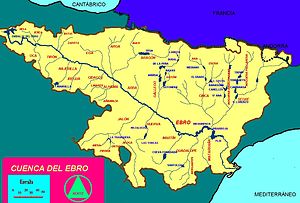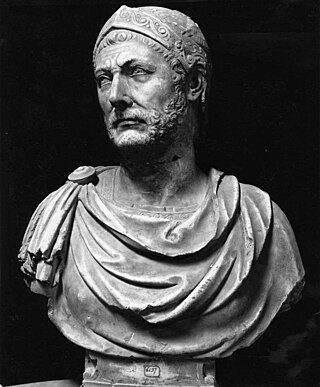
Hannibal was a Carthaginian general and statesman who commanded the forces of Carthage in their battle against the Roman Republic during the Second Punic War.
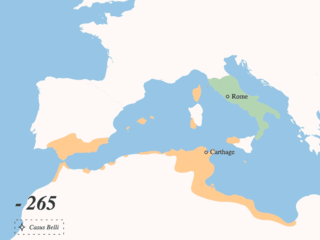
The Punic Wars were a series of wars between 264 and 146 BC fought between the Roman Republic and Ancient Carthage. Three wars took place, on both land and sea, across the western Mediterranean region and involved a total of forty-three years of warfare. The Punic Wars are also considered to include the four-year-long revolt against Carthage which started in 241 BC. Each war involved immense materiel and human losses on both sides.

The Second Punic War was the second of three wars fought between Carthage and Rome, the two main powers of the western Mediterranean in the 3rd century BC. For 17 years the two states struggled for supremacy, primarily in Italy and Iberia, but also on the islands of Sicily and Sardinia and, towards the end of the war, in North Africa. After immense materiel and human losses on both sides, the Carthaginians were once again defeated. Macedonia, Syracuse and several Numidian kingdoms were drawn into the fighting, and Iberian and Gallic forces fought on both sides. There were three main military theatres during the war: Italy, where Hannibal defeated the Roman legions repeatedly, with occasional subsidiary campaigns in Sicily, Sardinia and Greece; Iberia, where Hasdrubal, a younger brother of Hannibal, defended the Carthaginian colonial cities with mixed success before moving into Italy; and Africa, where Rome finally won the war.
This article concerns the period 219 BC – 210 BC.
Year 219 BC was a year of the pre-Julian Roman calendar. At the time it was known as the Year of the Consulship of Paullus and Salinator. The denomination 219 BC for this year has been used since the early medieval period, when the Anno Domini calendar era became the prevalent method in Europe for naming years.
The Battle of Zama was fought in 202 BC in what is now Tunisia between a Roman army commanded by Scipio Africanus and a Carthaginian army commanded by Hannibal. The battle was part of the Second Punic War and resulted in such a severe defeat for the Carthaginians that they capitulated, while Hannibal was forced into exile. The Roman army of approximately 30,000 men was outnumbered by the Carthaginians who fielded either 40,000 or 50,000; the Romans were stronger in cavalry, but the Carthaginians had 80 war elephants.
Quintus Baebius Tamphilus was a praetor of the Roman Republic who participated in negotiations with Hannibal attempting to forestall the Second Punic War.

Hasdrubal Barca, a latinization of ʿAzrubaʿal son of Hamilcar Barca, was a Carthaginian general in the Second Punic War. He was the brother of Hannibal and Mago Barca.
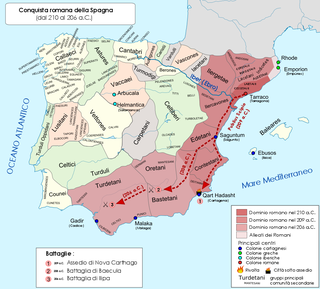
The Battle of Baecula was a major field battle in Iberia during the Second Punic War. Roman Republican and Iberian auxiliary forces under the command of Scipio Africanus routed the Carthaginian army of Hasdrubal Barca.

Gaius Claudius Nero was a Roman general active during the Second Punic War against the invading Carthaginian force, led by Hannibal Barca. During a military career that began as legate in 214 BC, he was praetor in 212 BC, propraetor in 211 BC during the siege of Capua, before being sent to Spain that same year. He became consul in 207 BC.
The Battle of the Upper Baetis was a double battle, comprising the battles of Castulo and Ilorca, fought in 211 BC during the Second Punic War between a Carthaginian force led by Hasdrubal Barca and a Roman force led by Publius Cornelius Scipio and his brother Gnaeus. The immediate result was a Carthaginian victory in which both Roman brothers were killed. Before this defeat, the brothers had spent seven years campaigning against the Carthaginians in Hispania, thus limiting the resources available to Hannibal, who was simultaneously fighting the Romans in Italy.
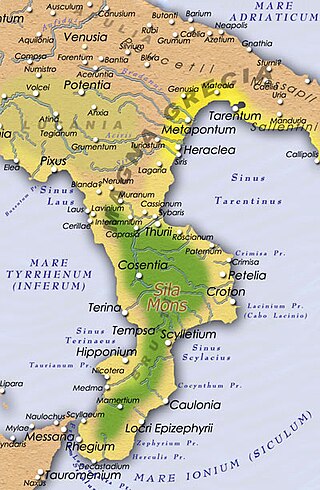
The Battles of Kroton in 204 and 203 BC were, as well as the raid in Cisalpine Gaul, the last larger scale engagements between the Romans and the Carthaginians in Italy during the Second Punic War. After Hannibal’s retreat to Bruttium due to the Metaurus debacle, the Romans continuously tried to block his forces from gaining access to the Ionian Sea and cut his eventual escape to Carthage by capturing Kroton, the last port which had remained in his hands after years of fighting.

Hasdrubal the Fair was a Carthaginian military leader and politician, governor in Iberia after Hamilcar Barca's death, and founder of Cartagena.

The Battle of Ebro River was a naval battle fought near the mouth of Ebro River in the spring of 217 BC between a Carthaginian fleet of approximately 40 quinqueremes, under the command of Himilco, and a Roman fleet of 35 ships, under Gnaeus Cornelius Scipio Calvus. Hasdrubal Barca, the Carthaginian commander in Iberia, had launched a joint expedition to destroy the Roman base north of the Ebro River. The Carthaginian naval contingent was totally defeated after a surprise attack by the Roman ships, losing 29 ships and the control of seas around Iberia. The reputation of the Romans was further enhanced in Iberia after this victory, causing rebellion among some of the Iberian tribes under Carthaginian control.

The Battle of Ibera, also known as the Battle of Dertosa, was fought in the spring of 215 BC on the south bank of the Ebro River near the town of Ibera and was part of the Second Punic War. A Roman army, under the command of the brothers Gnaeus and Publius Scipio, defeated a similarly sized Carthaginian army under Hasdrubal Barca. The Romans, under Gnaeus Scipio, had invaded Iberia in late 218 BC and established a foothold after winning the Battle of Cissa. This lodgement, on the north-east Iberian coast, between the Ebro and the Pyrenees, blocked the route of any reinforcements from Iberia for the army of Hannibal, who had invaded Italy from Iberia earlier in the year. Hasdrubal attempted to evict the Romans in 217 BC, but this ended in defeat when the Carthaginian naval contingent was mauled at the Battle of Ebro River.

The siege of Saguntum took place in 219 BC between the Carthaginians and the Saguntines at the town of Saguntum, near the modern town of Sagunto in the province of Valencia, Spain. The battle is mainly remembered today because it triggered one of the most important wars of antiquity, the Second Punic War.

The Roman Republic conquered and occupied territories in the Iberian Peninsula that were previously under the control of native Celtic, Iberian, Celtiberian and Aquitanian tribes and the Carthaginian Empire. The Carthaginian territories in the south and east of the peninsula were conquered in 206 BC during the Second Punic War. Control was gradually extended over most of the peninsula without annexations. It was completed after the end of the Roman Republic, by Augustus, the first Roman emperor, who annexed the whole of the peninsula to the Roman Empire in 19 BC.

The Battle of Lilybaeum was the first clash between the navies of Carthage and Rome in 218 BC during the Second Punic War. The Carthaginians had sent 35 quinqueremes to raid Sicily, starting with Lilybaeum. The Romans, warned by Hiero of Syracuse of the coming raid, had time to intercept the Carthaginian contingent with a fleet of 20 quinqueremes and managed to capture several Carthaginian ships.
This section of the timeline of Hispania concerns Spanish and Portuguese history events from the Carthaginian conquests to before the barbarian invasions.

Hannibal's crossing of the Alps in 218 BC was one of the major events of the Second Punic War, and one of the most celebrated achievements of any military force in ancient warfare.
